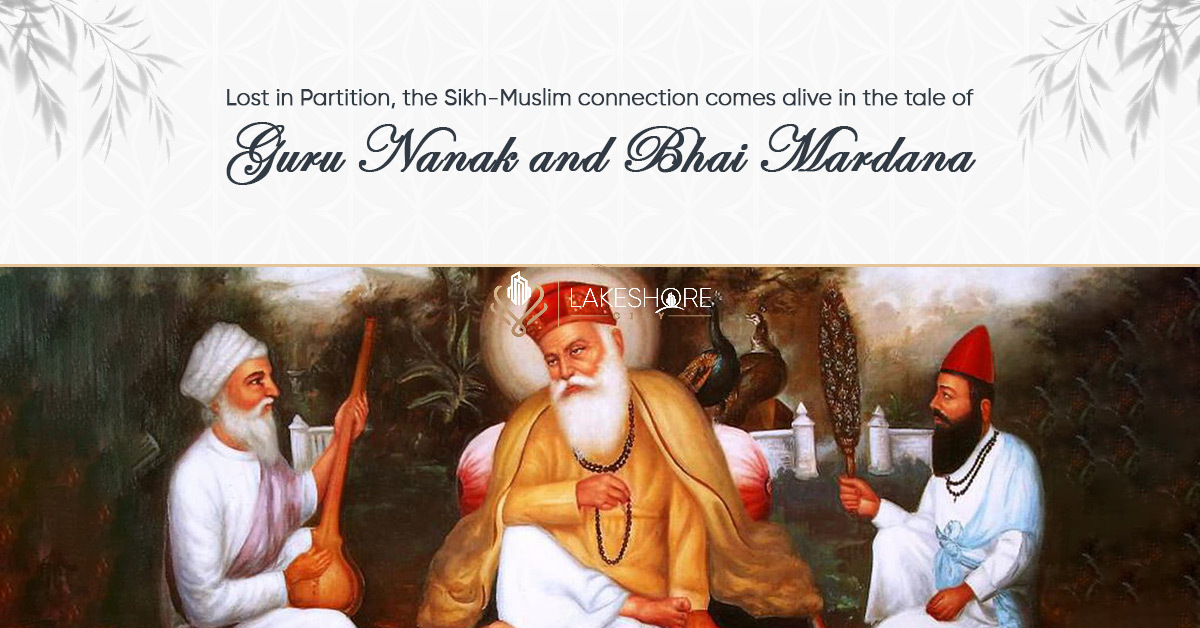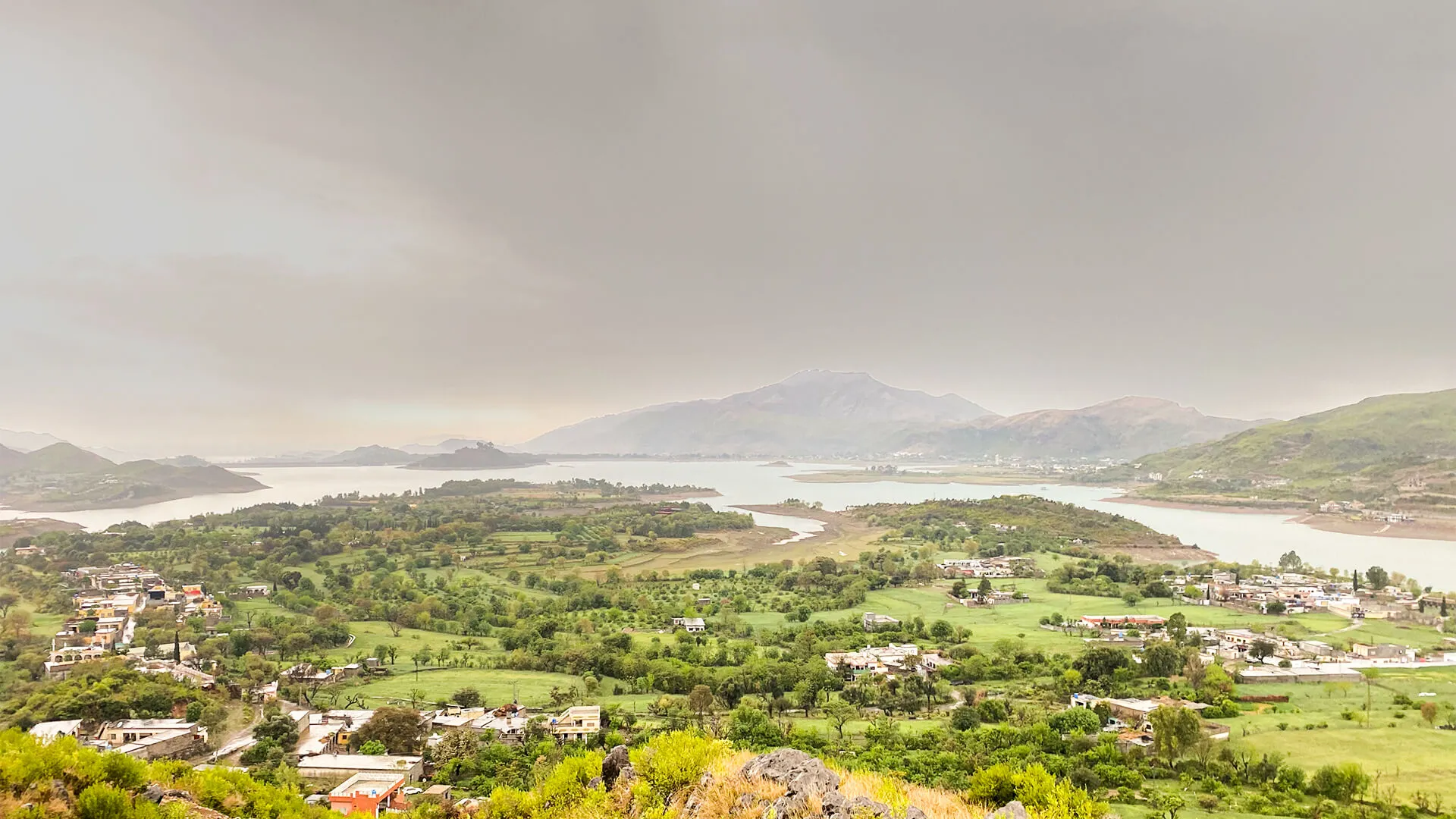The significance of the rubabi tradition in Sikhism is discussed by a descendent of the guru’s Muslim student.
“Why didn’t the Muslim Rubabi get any protection? They have such a high rank in the Sikh religion. Why were they given permission to depart East Punjab during the Partition? I queried.
Ghulam Hussain was the target of the query. I was in his house, which was located close to the shrine of Data Darbar, the city’s patron saint, in the heart of Lahore’s historic district.
The elderly man, who was wearing a white shalwar kameez and a maroon waistcoat with a white scarf knotted around his neck, had only recently recovered from what had started to become a regular illness for him. Despite this, he had granted my request for an interview.
The Golden Temple and a picture of a kirpan, as well as numerous accolades he had earned from Sikh organisations over the years, were displayed on the walls and cabinet behind him as symbols of the Sikh faith.
They were accompanied by a few Islamic symbols, such as a poster bearing a verse from the Quran. In February 2014, Hussain and I first spoke. The next year, in April, he passed away, and this may have been his final interview.
After learning that Ghulam Hussain was a relative of Bhai Mardana, Guru Nanak’s Muslim rubabi, I spent a few years looking for him.
The growth of the Sikh religion was significantly influenced by Bhai Mardana. He not only travelled with Guru Nanak, but also accompanied him while Nanak sang poetry that had been divinely inspired.
Since their time, Muslim rubabi had been assigned the duty of leading the kirtan at gurdwaras—until Partition abruptly ended the custom.
From kirtan to qawwali
“At the time, everyone was only thinking about themselves,” Hussain recounted.
“Since we were Muslims, we had to go. Whether we were Rubabi made no difference. Our Muslim identity was what was important. We adopted that as our whole identity. In fact, a few of our rubabi really perished in the rioting. One of them was Bhai Moti, my husband’s father-in-law. At a gurdwara in Patiala, he once performed on the tabla. Another rubabi who performed in the gurdwara of Guru Amardas in Goindwal was also murdered.
My chacha, Bhai Chand, was a rubabi at the Golden Temple, he said. In Amritsar, he owned three mansions, each of which had three stories. He had amassed a million dollars by then. He formerly resided in the neighbourhood known as Bhaiyyon ki Gali after the Rubabi family. In Pakistan, he was reduced to poverty.
Hussain explained his Sikh lineage, stating that the Siyachal Sahib Gurdwara, located halfway between Lahore and Amritsar, was the ancestral home of his family. His father was a gyani who led the audience in prayer and delivered Sikhism lectures.
He said, “My father was the gadi nasheen of the rubabi seat there, therefore I would have succeeded him eventually.
However, Partition altered everything.
Hussain claimed, “Not only did we lose our money, but we also lost our profession. “Aside from the kalma, the only thing we knew about being Muslims was that we knew the [Guru] Granth off by heart. The Muslims were uninterested in our line of work. As a result, we started working odd jobs selling meat, samosas, and kheer.
Hussain, however, soon discovered a second calling in qawwali after being invited to perform at the Nizami Art Society, a local cultural body.
“At one of these meetings, not many years after Partition, I was invited to perform qawwali,” Hussain recalled.
“In those early days, I had trouble pronouncing Urdu. Despite being trained in Gurmukhi, I was unable to even read the script. I did, however, practise and eventually became proficient at Urdu singing. My financial situation also started to become better.
How similar or distinct are the kirtan and qawwali traditions, I questioned him.
A group of 100 intelligent persons sitting together will eventually say the same thing, whereas a group of 100 fools will each say something different, according to an old Punjabi proverb, he said in response. Nanak’s remarks were repeated by Bulleh Shah. The message of Shah Hussain is the same as that of Guru Arjan and Sultan Bahu. Their kalam crosses over. I’d even go so far as to suggest that Guru Nanak explained the Quran. So, in response to your inquiry, qawwali and kirtan belong to the same lineage.
Ghulam Hussain’s family has strong ties to the Golden Temple, and in 2005 he finally had the chance to go there. —AFP
A dying connection
But not everyone agrees with his assessment of syncretism.
As the discussion went on, Hussain’s son, who was sitting next to us quietly, abruptly entered the conversation.
He added that some Sikhs believed Mardana to be nothing more than a comical figure in Nanak’s Janamsakhis who was constantly either hungry or thirsty. “I’d go with disagreeing. Mardana was the one who revealed Nanak’s divinity. Nanak made the bitter fruit of the Kekkar tree palatable for Mardana.
Hussain had a unique tale concerning Mardana’s significance in the development of Sikhism. “Once, before Partition, my father was at Gurdwara Panja Sahib in Hassanabdal,” the man recalled.
“He was having a bath in the holy water when a Sikh took offence and reported him to the office. He declared that my father had contaminated the water. The office called and asked to see my father. When asked why he had dove into the water, he replied, “Who did Nanak build this pool for? Mardana’s thirst must be satisfied. As a result, I am Mardana’s descendant because I am a rubabi. Who are you to claim ownership over this pool, let me ask you now?
He laughed out loud as he finished this narrative, but he soon got sombre as he talked about his 2005 trip to India, where he visited the Golden Temple for the first time since Partition. He remarked, “I wanted to perform at the Golden Temple.
There had been a performance by my family for seven generations. We are Bhai Sadha and Madha’s descendants; they served under Guru Tegh Bahadur at the Golden Temple. Our status was such that we used to be given a portion of the offerings made at the shrine, which were subsequently divided equally among all the rubabi families. The rubabis have proven their guru-loyalty throughout Sikh history. When no other Sikh dared enter their land, Bhai Bavak, a rubabi with Guru Hargobind, saved his daughter, Bibi Veera, from the Turks.
Hussain wanted to perform at the gurdwara, but that was not to happen.
“Our family has a strong bond with the Golden Temple, but it is currently very challenging for a rubabi to lead kirtan there. He said, alluding to Sikhs who have been initiated or baptised by consuming amrit or “nectar water,” that only Amritdhari may perform there.
Read More: Celebrations as Pakistan Welcomes Indian Sikhs for Guru Nanak’s Birthday
“I wanted to tell those officials that my ancestors had been singing kirtan here before Gobind Rai became Guru Gobind Singh,” the man continued. There is no history of any rubabi renunciating Islam. What authority did these officials have if the gurus had never requested that we convert to Sikhism?
Don’t miss the chance to invest with Lakeshore! Secure your investment today by investing your financial investment with Lakeshore in the following available options like Lakeshore City, Lakeshore Club, and Lakeshore Farms.
For More updates, please Contact +92 335 7775253 or visit our website https://lakeshorecity.com/
Lakeshore City is the upcoming elite lifestyle at Khanpur Dam. Offering no parallel amenities for the members and owners of distinguished farmhouses.
Become Part of Luxurious Lifestyle
Contact: 0335 7775253



